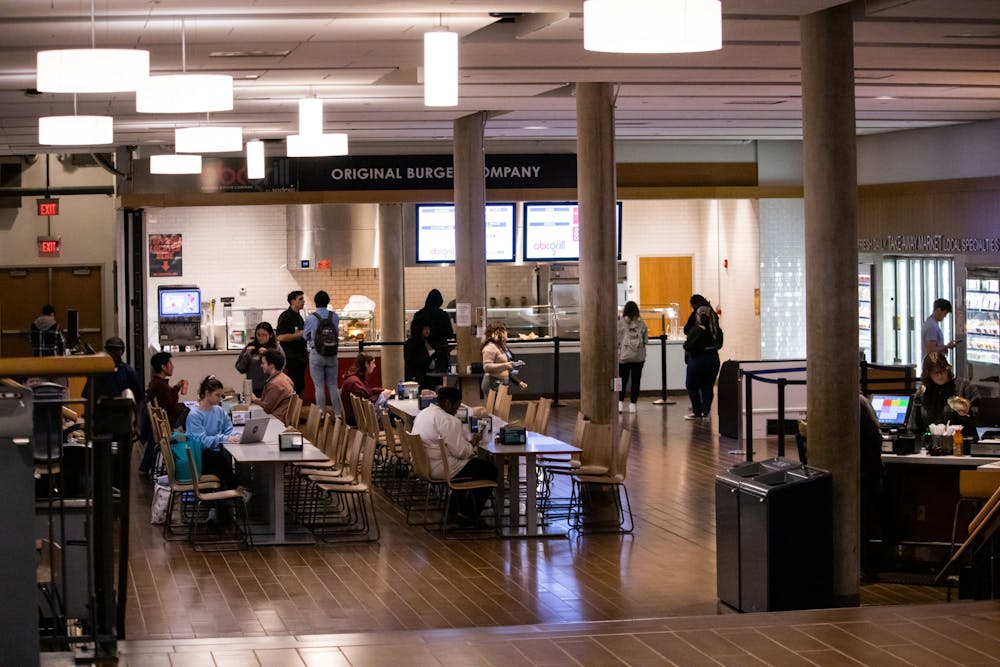By Rebecca Heath
News Editor
Senior psychology major Renata Curcio, like many college students, lives paycheck to paycheck.
Since starting her job as a Recreation Center associate in January 2021, Curcio had been able to support herself by working the division’s maximum 15 hours per week — until her hours were suddenly reduced by half at the beginning of the semester.
Now, with opportunities to pick up extra shifts to compensate for her lost wages scarce due to a “decrease in staff demand,” Curcio is forced to work a second job off-campus to pay her bills.
“It sucks that students have lost hours. We are college students trying to stay alive,” Curcio said. “I thankfully got another job, but not everyone can afford to drive 20 minutes.”
The Recreation Center is one of several student employment sites across campus to recently cut down work hours and remove positions altogether. According to Luke Sacks, the College's head of media relations, the cuts are part of a campus-wide effort to “close the gap,” as the College seeks to reduce budget deficits in future fiscal years.
“The college experienced a budget gap this year that all divisions across campus helped close,” Sacks told The Signal. “In some cases, offices may have reduced student-worker hours based on their assessment of need in order to help meet budget reduction targets.”
Senior psychology major and residential mailroom employee Brianne Apostolico said her weekly hours were reduced from 12 to nine this semester, which equates to one less shift per week. According to Apostolico, all of her coworkers who typically work more than the division’s minimum of six hours per week have faced the same reduction.
With each shift now staffed with three students instead of four, Apostolico said she and her coworkers have been expected to compensate by managing an increased workload, which has been particularly stressful given the fall season is the “busiest time of the year” for the mailroom.
“We're not open from 12 p.m. to 2 p.m. and that's supposed to be when we get the scanning of the packages done. But because there's so many and because we have one less person on shift, we're pretty much scanning packages all day long,” Apostolico said.
Rebecca Nieves, a junior tutoring center employee majoring in journalism and professional writing, said that her weekly hours were reduced from seven to five, and while she feels “lucky” to still have her job, she’s frustrated that she and her coworkers are being undervalued.
“It's not that much, but as someone who works on campus and that's my only job, I put a lot of time and effort into tutoring,” Nieves said. “I feel like everyone at the tutoring center does, and it's frustrating when the amount of work that you're putting in, you're not getting enough hours to really cover your expenses.”
In an effort to improve working conditions for student employees, Jess Mirkin, a senior criminology major and president of the College’s chapter of the Young Democratic Socialists of America (YDSA), has set out to spearhead a student labor union, which would be a first-of-its-kind establishment at the College. With student unions recently gaining traction at undergraduate institutions across the country, Mirkin is hopeful she will be able to rally enough support at the College to catalyze change.
Motivated by her own experiences working in what she called a toxic environment on campus, Mirkin made it her mission this semester to revive the initiative, which was initially pitched two years ago by a former YDSA executive board member and student employee who faced significant delays receiving his paychecks. As part of her initial efforts to put “the idea into fruition,” she talked to student employees across numerous divisions, where she learned the extent of the concerns.
“There was so much more than just not getting paid on time,” Mirkin said. “It was people getting different wages, having to work long strenuous hours for very little pay and having their labor be exploited. As a result, this year, I really wanted to try and establish something that would potentially help students overall.”
Mirkin, who holds a job both on and off campus, said the recent hours cuts largely motivated the YDSA executive board to reignite their efforts.
“On-campus for a lot of students is their only way of making a wage, especially for those that don't have any means of transportation,” Mirkin said. “So it's really important that they're getting these hours so that they can live and by TCNJ stripping that of their students, they’re essentially saying, ‘oh well, that's tough.’”
Mirkin said her next step is establishing an official meeting during the spring semester where student workers will be encouraged to share their experiences. She then hopes to garner student support for the union through a petition before seeking recognition from administration.
“I want students to be able to feel like they have a voice on campus,” Mirkin said. “I feel like a lot of the things that we've seen this semester have kind of stripped us of that….The whole goal behind this is to make students feel empowered and feel like they have a say in what goes on. I would like for this to be an opportunity for everyone to really speak up.”







